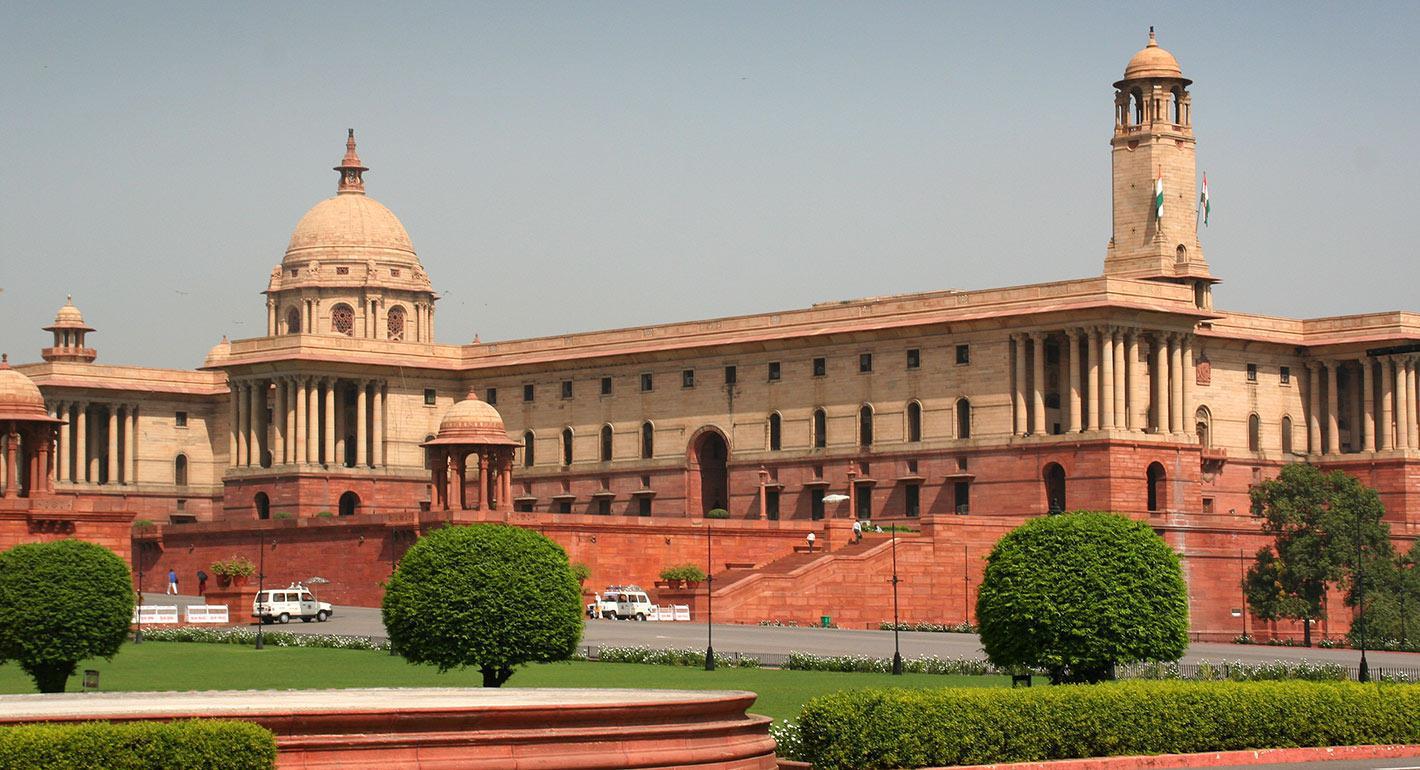- +4
Milan Vaishnav, Rahul Verma, Rukmini S., …
{
"authors": [
"Christophe Jaffrelot"
],
"type": "legacyinthemedia",
"centerAffiliationAll": "dc",
"centers": [
"Carnegie Endowment for International Peace"
],
"collections": [],
"englishNewsletterAll": "",
"nonEnglishNewsletterAll": "",
"primaryCenter": "Carnegie Endowment for International Peace",
"programAffiliation": "SAP",
"programs": [
"South Asia"
],
"projects": [],
"regions": [
"South Asia",
"India"
],
"topics": [
"Political Reform",
"Foreign Policy"
]
}
Source: Getty
Government is Promoting a Culture of Secrecy, Undermining Legislation Such as RTI
The Election Commission of India (ECI) criticised the opacity of this financial mechanism and described it as “a retrograde step”.
Source: Indian Express
While transparency is a cornerstone of democracy, today’s India is cultivating secrecy. Paradoxically, this culture of secrecy is sometimes justified in the name of transparency.
Electoral bonds are a case in point. They were introduced in February 2017 by the Centre in the name of transparency — they allowed anonymous donations to political parties and, therefore, protected the privacy of the donors! The Election Commission of India (ECI) criticised the opacity of this financial mechanism and described it as “a retrograde step”. The ECI told the government that this arrangement would prevent the state from ascertaining whether a “political party has taken any donation in violation of provisions under Section 29B of the Representation of the People Act, which prohibits the political parties from taking donations from government companies and foreign sources”. Electoral bonds also made it impossible to check whether a company was giving to parties more than what the Companies Act (2013) permitted, that is 7.5 per cent of the net average profit of the three preceding financial years. The government has not been deterred by these legal concerns, presumably because the benefits it could derive from behind-the-curtains bargains with the corporate sector are much more attractive than the opprobrium resulting from the ECI’s reprimands.
Similarly, sealed envelope has become a modus operandi in several Indian institutions, including the Supreme Court (SC). In the case of political funding (by electoral bonds or otherwise), a three-judge bench headed by the then Chief Justice Ranjan Gogoi in 2019 directed political parties to submit the details of donations received to the ECI in sealed cover by May 30, that is after the elections. The matter stopped there. The Assam administration had to show the progress it was making in the implementation of the National Register of Citizens by submitting reports in sealed covers to Justice Gogoi. When Justice Gogoi was accused of sexual harassment, the panel formed by the SC found “no substance in the allegations” on the basis of a report it had received in a sealed cover that was not disclosed even to the complainant. Commenting on these developments, Justice Madan Lokur wrote that “secrecy is the name of the game”.
This craze for secrecy has affected the Right to Information Act, the UPA-legislated law that had made India progress more quickly than most democracies on the road to transparency. First, the government did not appoint a Chief Information Commissioner for a year after the incumbent retired in August 2014, and did not fill vacant information commissioner posts in the Central Information Commission (CIC) between 2016 and 2018, a year when, consequently, only seven commissioners out of the sanctioned strength of 11 were in place. After the SC intervened, some appointments were made in January 2019, but four posts remained vacant, a clear indication of the government’s lack of interest in the CIC and/or its attempt to weaken it. The backlog of pending appeals had reached 30,000 cases in late 2019 as the CIC has become a rather dysfunctional body.
Second, the government refused to disclose information which was previously available under the RTI Act. Queries about phone tapping are not responded to anymore. In 2016-17, the home and finance ministries rejected close to 15 per cent of the applications they received while the RBI and public sector banks rejected 33 per cent. The RBI, for instance, refused to give any information about the decision-making process that led to demonetisation.
Third, during the 2019 Monsoon Session of Parliament, just after the Lok Sabha election, the Modi government amended the RTI Act to limit the power of the CIC. The five-year fixed tenure for the Chief Information Commissioner and information commissioners was abolished. Their salaries were not fixed any more — as with Election Commissioners — but notified separately by the government.
The government also diluted the Whistleblower’s Protection Act. Whistleblowers can now be prosecuted for possessing the documents on which the complaint has been made. Issues flagged by them have to be in “public interest” and should not be “affecting the sovereignty and integrity of India”, related to “commercial confidence” or “information received in confidence from a foreign government”.
In the same vein, data phobia has resulted in the non-publication or alteration of some statistical information by government organisations. The National Statistical Commission and the Chief Statistician of India faced a credibility crisis during Modi’s first term when the new GDP series was released. Subsequently, growth rate figures were changed so often that 108 social scientists wrote an open letter in 2019 inviting the government to “reestablish institutional independence and integrity to the statistical organisations”. Similarly, the National Crime Records Bureau has been affected by delays (its 2017 report was released in October 2019) and deletions. For instance, lynchings and “religious killings” are no longer enumerated and the number of members of religious communities in the police forces (information that had been introduced by the Vajpayee government) is not listed. The National Sample Survey Office has also not been spared. In 2019, nearly 200 scholars wrote to the government to release the 75th round survey of consumer expenditures — which had found that the percentage of citizens living below the poverty line had increased between 2011-12 and 2017-18.
This year, given the negative growth that India is bound to register, bad news of that kind are likely to multiply. To conceal the truth would make things worse because the actors in the economy would not be in a position to adjust to the real situation. Transparency is not only necessary for maintaining a democratic polity, it is also necessary for making the economy work. Facts are sometimes unpleasant, but the nation needs to know — and may be wants to know, even if nobody is asking any more.
This article was originally published by the Indian Express.
About the Author

Former Nonresident Scholar, South Asia Program
Jaffrelot’s core research focuses on theories of nationalism and democracy, mobilization of the lower castes and Dalits (ex-untouchables) in India, the Hindu nationalist movement, and ethnic conflicts in Pakistan.
- The BJP in Power: Indian Democracy and Religious NationalismResearch
- Ceasefire Violations in Kashmir: A War by Other Means?Article
Christophe Jaffrelot
Recent Work
Carnegie does not take institutional positions on public policy issues; the views represented herein are those of the author(s) and do not necessarily reflect the views of Carnegie, its staff, or its trustees.
More Work from Carnegie Endowment for International Peace
- How Far Can Russian Arms Help Iran?Commentary
Arms supplies from Russia to Iran will not only continue, but could grow significantly if Russia gets the opportunity.
Nikita Smagin
- Is a Conflict-Ending Solution Even Possible in Ukraine?Commentary
On the fourth anniversary of Russia’s full-scale invasion, Carnegie experts discuss the war’s impacts and what might come next.
- +1
Eric Ciaramella, Aaron David Miller, Alexandra Prokopenko, …
- The Kremlin Is Destroying Its Own System of Coerced VotingCommentary
The use of technology to mobilize Russians to vote—a system tied to the relative material well-being of the electorate, its high dependence on the state, and a far-reaching system of digital control—is breaking down.
Andrey Pertsev
- Indian Americans Still Lean Left. Just Not as Reliably.Commentary
New data from the 2026 Indian American Attitudes Survey show that Democratic support has not fully rebounded from 2020.
- +1
Sumitra Badrinathan, Devesh Kapur, Andy Robaina, …
- Taking the Pulse: Can European Defense Survive the Death of FCAS?Commentary
France and Germany’s failure to agree on the Future Combat Air System (FCAS) raises questions about European defense. Amid industrial rivalries and competing strategic cultures, what does the future of European military industrial projects look like?
Rym Momtaz, ed.














